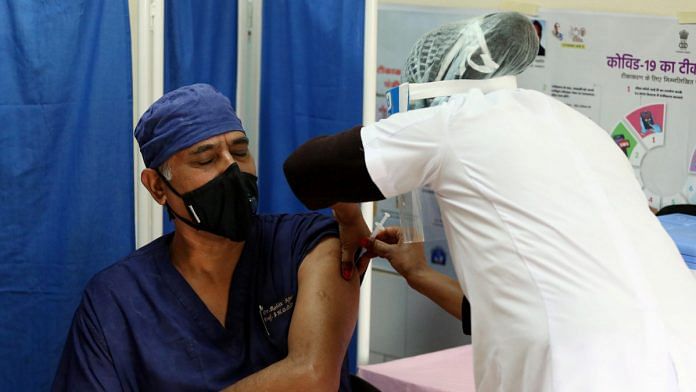New Delhi: A handful of Covid-19 vaccination centres in the national capital will soon start conducting antibody tests before and after beneficiaries receive the shot to test its efficacy, ThePrint has learnt.
The research will be conducted after hospitals or vaccination centres get essential approvals from their respective ethical committees.
Rajiv Gandhi Super Speciality Hospital, the largest cold chain point and vaccination storage facility in New Delhi, has already received the requisite permission from its ethical committee. Its medical director Dr B.L. Sherwal told ThePrint Wednesday: “After taking beneficiaries into confidence, the plan is to conduct an antibody test before the first dose and after the second dose to observe what comes of the vaccination.”
Several other medical institutes and public health experts, including government officials, have advocated this method. Dr Suneela Garg, sub-dean of Maulana Azad Medical College and advisor to the Indian Council of Medical Research (ICMR), said: “I will have a word with the ICMR to check if they’ve received any more such proposals, but we are planning to conduct antibody tests in individuals a month into the vaccination drive.”
However, Garg clarified that consent forms will be given out to healthcare workers who decide to be part of the research, since it involves taking someone’s blood samples.
“This might also help address the issue of hesitancy among people about getting vaccinated, once they see for themselves what comes of the research,” she added.
Rajiv Garg, Director General Health Services in the Union Ministry of Health and Family Welfare, made it clear that this was not a formal plan at the central government level, but “hospitals can do it at their own level and have complete freedom to take permission from the local ethical committee to carry this out for research purposes”.
Also read: WhatsApp reminders, counselling, newspaper ads — how states are fighting vaccine hesitancy
Covaxin hospitals favour research
Hospitals receiving Bharat Biotech’s Covaxin are particularly in favour of this move, given that it was approved before completing phase-3 trials for efficacy.
Dr Kabir Sardana, a dermatologist at Ram Manohar Lohia Hospital, one of the six vaccination centres in Delhi to only receive Covaxin, explained: “This could be a useful tweak to get more people to come forward, especially where healthcare workers don’t have a choice but to be administered Covaxin at their hospital. In a trial, patients undergo serological tests before getting the vaccines, and the same ought to be done for HCWs also.”
Sardana continued: “Say, if 100 HCWs who get Covaxin are followed for six months, and say, 10 get the infection, that would show a 90 per cent efficacy rate. But if 50 have already had an infection and are serological antibody positive, then the actual efficacy is just 40 per cent, as obviously they have been infected. And if, by any chance, some of these who are already positive in spite of the vaccine get the infection, then we don’t have such a great story after all.”
Another doctor at RML Hospital who didn’t wish to be named concurred. “Using existing resources of serological testing in institutions, a certain sample can be tested for antibodies before the vaccine and after three weeks of the first and possibly the second dose. It could make for a very robust reporting of efficacy, and would mirror the existing trial protocol,” this doctor said.
Pulmonologist and medical researcher Anurag Agarwal also advocated the research. “It should become the default mode at as many vaccination centres as possible. It is the logical thing to do, and one should conduct antibody tests before both and after the first and second dose of the vaccine so that one can study the variation levels,” said Agarwal, director of the Institute of Genomics and Integrative Biology (IGIB).
At the privately-owned Sir Gangaram Hospital, however, authorities might wait for the government to make a formal announcement before they begin conducting antibody tests. “We don’t have the kind of resources to conduct as many antibody tests as we would like, but if we don’t hear from the government by April, we might consider doing it at our level for research,” Dr D.S. Rana, the medical superintendent, said.
Also read: Herd immunity could be closer than we think, vaccines must end isolation



